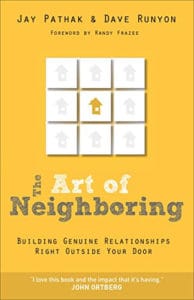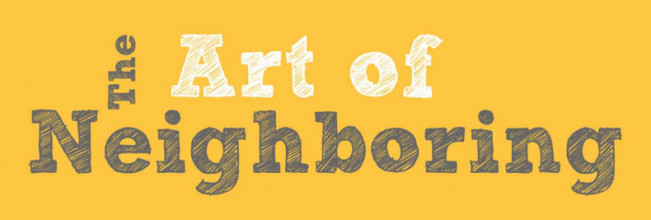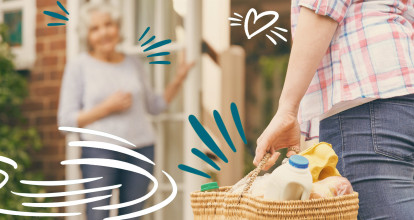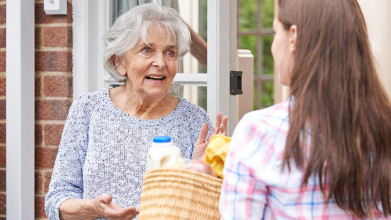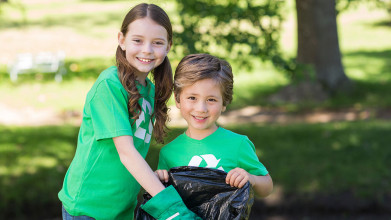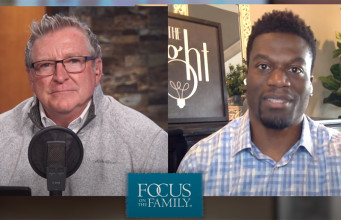Excerpt:
Pastor Jay Pathak: And what if the people of God learned how to take the teachings of Jesus seriously? Like we’re to love those who persecute us. We’re to pray for those that we find difficult or annoying or challenging. I mean, what if every believer could try that out in their neighborhood? And I think we kind of have to because we can’t escape it. So, it’s – it’s an opportunity if we choose to see it as such, to grow and really try on the teachings of Jesus in a new way.
End of Excerpt
John Fuller: That’s Jay Pathak and he’s our guest today on Focus on the Family, along with Dave Runyon. And we’re going be talking about neighboring during this covid-19 pandemic. I’m John Fuller and your host is Focus president and author Jim Daly.
Jim Daly: You know, John, while the pandemic has brought out some, you know, horrific situations there are also some silver linings around the dark cloud. I think the deep appreciation for first responders has been awesome. People now recognizing what doctors and nurses actually do to put their own lives at risk to help save ours. And that’s been wonderful to acknowledge them. Perhaps for the first time in that way. Also, where we’re at with our neighbors. I think in some ways even though we’ve had social distancing and those kinds of things neighbors have helped their neighbors to do grocery shopping or do other things. And I’m so proud of Jean. She’s done some of that for our neighborhood. It’s been great to see. And today, we’re going to talk with two people that we talked with a few years ago in how to reach your neighbor. And I think the folks are going to enjoy listening to these wonderful ideas about fulfilling the second commandment of Jesus and actually loving your neighbor as you’d love yourself.
John: Hmm. Well, as you said, Jim, our guests have been here before. Jay Pathak and Dave Runyon are pastors up in the Denver area. And they were a great book that we talked about. We’ll link over to that previous conversation. The book is called The Art of Neighboring.
Jim: Jay and Dave, welcome back to Focus on the Family.
Pastor Dave Runyon: It’s great to be here.
Jay: Great to be here.
Jim: So, listen. It was probably 2014 when we had you on and you were doing some things in Arvada that were quite unique to reach your neighbor. And the story about that started with a meeting that the pastors there had with the mayor. And Dave, you were there. I don’t know, Jay, if you’re both there.
Dave: Oh, yeah, we are we are both there.
Jim: OK.
Dave: And we came together with about 20 or so pastors in Arvada right outside of Denver, Colorado. And we were really trying to figure out what could we do together in our city. How could the body of Christ be on the same team and have an impact? And so, we invited in our mayor and our mayor came and sat with us. And we just kind of got to know him and got to know some of his story. And then we just asked him, you know, “What should we do together? How could we have the biggest impact if we actually wanted to work together in our community?” And he said something that surprised us and that put Jay and I on a trajectory that we weren’t expecting. Our mayor just said, “You know, if you guys could start a neighboring movement, it would be the best thing that can happen in our community.” And he went on to share that they had been talking at the city level of the fact that when people know those that live right around them, the people based on proximity, that there’s a lot less weight on all of the programs that they’re trying to create for people in need.
Jim: That’s fascinating.
Dave: You know, and so, he – he said, “Oh, yeah.” You know, and it said, “We can raise a bunch of money and start a new program for elderly shut-ins or that person who’s growing older and more isolated that doesn’t have family around, could live in an apartment complex or could live on a block where the people know them and actually care for him out of relationship.” And that – he said this beautiful line and so did some other people on the city staff. They said, “What we’re learning at the city is that relationships always trump programs.”
Jim: Huh. Um, Jay, you came up with a diagram to help people do this and that’s what we covered in that earlier broadcast. And John, I’m not sure if we’re gonna put this together as a two pack, but maybe, folks, we can also include that broadcast information. But, Jay, refresh us with what you came up with to help people better do neighboring.
Jay: Really the basic things like a tic-tac-toe board.
Jim: Right.
Jay: With your address. (Unintelligible) Then you just – the question is, do you know the names of the people that surround you? So, if you – the eight neighbors just start at the top of the box writing their names. And we found as we’ve done this now all over the country, it’s somewhere about five to 10 percent of people can name all eight of their neighbors.
Jim: I mean, it’s amazing and it’s simple and it’s something that, you know, when I heard about it, that’s why I wanted to have you on those many years ago so people would think about this. I guess, what is the fundamental reason that we’re not in tune with our neighbors? What’s going on?
Dave: Yeah. I think there’s a couple reasons for that, Jim. One of them is that the pace that we live at is way faster than it was 40, 50 years ago. And there’s a lot of reasons for this. Technology is one of those. And so, there’s just less margin in people’s lives to engage with the people who live right around them. I mean, people used to leave work and they actually stopped working. And now we leave work and we’ve got this thing in our pocket that allows us to continue to work all the time. And so, we spend less time in our front yard than we used to. And then I think there’s also just a general fear. We get exposed to a lot more stories of brokenness in our world. And that causes kind of this chronic anxiety for people. And we make assumptions about the people who live around us, negative assumptions, more quickly than we – than we used to. And so, I think those are two of the main factors that have the value of literal neighboring a little bit lower than it used to be.
Jim: Yeah.
Dave: And – and those are the obstacles that we’ve got to overcome.
Jim: Well, you know, everybody knows the Scripture that says, “Love the Lord your God with all your heart, soul and mind. And if you’ve got extra capacity, love your neighbor as yourself.”
(Laughter)
Jim: Isn’t that how that goes?
(Laughter)
Dave: Well, I think it actually says if – “unless they’re annoying” or “unless you don’t like them.”
(Laughter)
Jay: Yeah. Exactly. If they’re weird, you’re allowed to skip over them. That’s the rule. Yeah.
(Laughter)
Jim: I mean, but again, what’s so funny with us as human beings and I do say the Lord does have a sense of humor. I mean, He says, “Listen. I know 10 was kind of complicated for you so I’m going to boil it down to just two. Love your Father in heaven and love your neighbor.” And then we come back and say, “OK, Lord, there’s still one too many here.” (Laughter) I mean, so the – the basic thing about doing it – I mean, it’s not a suggestion the Lord is – is giving you. It’s a commandment to love your neighbor. I think the other key thing and I’d like for both of you to comment on this – one of the things that I’ve seen when engaging people that don’t agree with me in my Christian faith, it’s not typically where you start. You start with more human commonality. You know, if the person has an interest in cooking or, you know, just whatever there might be to connect with somebody to open up their heart. And I think that’s when the Lord says, “Love your neighbor.” There is so much more power in that that He knows our spiritual DNA. He knows how people are going to open up to the Holy Spirit in us if we demonstrate love to our neighbor. There’s something and I’ll say it – magical that happens when someone feels loved by somebody. It’s God’s fingerprint on us. We cannot resist it when somebody shows us respect and love.
Jay: Yeah. I mean, if we can just build simple ways for folks to connect. I mean, once you start connecting – you know someone’s name, you start a simple conversation – it gets the ball rolling. I mean, once the ball is rolling, your heart connects to them. It starts to affect your prayer life. You start to think about them as you’re doing your day-to-day activities. If you have a little extra when you made dinner, or you made some desserts, you think, “You know, maybe we should drop this off by our neighbors.” But when you don’t know their names, when you’ve not had any connection, it’s sort of like out of sight, out of mind. You don’t think about it. But just one small step leads to another small step. And next thing you know you’re connecting in a deep spiritual level.
Jim: Dave, in this kind of situation where we have a pandemic – I mean, how do we go about doing something like this? It’s a little unique right now. So, what do we do?
Dave: Yeah, for sure. And we actually had another amazing moment here in Colorado with Karen Gieseker. She’s an infectious disease epidemiologist here with the state of Colorado. And we run with her – I don’t know, about five weeks ago, maybe four weeks ago. And there’s a lot of churches that when all of this happened, just started to say, you know, “What can we do? How do we help believers to respond in this moment?” And she pulled another one of those moves on us where she pointed us back to the Bible and she didn’t even know about the neighboring story. She just said, “You know, what we need in this moment isn’t for churches to start a bunch of new programs. What we need is for the people who go to those churches to engage with their neighbors and to do it in very careful and thoughtful and safe ways.” And so, we’ve been working with her and some of the team to think how can we as believers take advantage of this moment? You know, we – people don’t have face-to-face interaction at work right now or at school. They – at church. But we’re seeing people everywhere in our neighborhoods. I’m sure, you know, John and Jim, you guys are the same way. You just see people out way more right now than we have in the past. And so, we have a moment as believers to really lean in here and to address some of the loneliness, some of the social isolation that’s going on, by connecting with the people that we live right around. And so, we put together this little tool kit. Which is I think why your team reached out to us is this toolkit has been a really powerful way for believers to just do some small things in their neighborhoods during this time of covid-19, um, that make a big difference. And it’s simple stuff. You know, it’s thinking about who are some of the older people that you live around? Could you reach out to them and just engage with them? Make sure – ask if they need anything. It’s looking at those people that you see walking by, but you may not stop and just to – to stop and to admit like Jay said – maybe I don’t know your name. And to remember their name. To use their name when you see them. Or maybe to ask, “Hey, how’s all this impacting your work? You know, what’s life been like with your kids in your home?” You know, we are in such an incredible moment right now where we can lean in and take the conversation below the surface into some things that really matter. And so, we built this little tool kit with a bunch of simple, practical things that believers can do to engage with their neighbors and to do it from six feet away. And so, we’re excited about that. I know that’ll be up on your site. And it’s been a really great tool for a lot of people around the country.
Jim: No, and that’s great. And, John, let’s link to that. And how do people do that, John?
John: We’re going to have the link at focusonthefamily.com/broadcast. Or give us a call and we’ll tell you more. 800, the letter A and the word FAMILY. And that’s The Art of Neighboring COVID-19 Tool Kit. We also have, of course, the original book, The Art of Neighboring by our guests, Jay and Dave. And it’s going to be a great resource for you as we all kind of come out of this season and enter into the new normal whatever that looks like.
Jim: You know, both of you are pastors and I guess the question I have is why – why have we lost the art of being a good neighbor? I know we’ve talked about the busyness of life, of course. Now we’ve got an excuse not to be outside and mixing with our neighbors. That’s the pandemic. But there are things like we’ve talked about that you can do. And I guess the re-orientation for us as Christians – we really should be the best at showing interest in our neighbors and having a heart for our neighbors. And that’s what you’re really inspiring people to do, right? Is kind of get back to the basics.
Jay: Yeah, I mean, I’ve been thinking a lot in the midst of this pandemic on how the church has always thrived when things go terribly wrong throughout church history.
Jim: Right.
Jay: The church right has survived and thrived through wars and famines and epidemics of all kinds. And so, in a very real way, this is our moment. You know, it’s the moment to wake up and remember who we were always meant to be. You know, especially when so many of the programs that we’ve depended upon – you know, the Sunday services and the classes and the things that we’ve been great at over time, those are taken from us. So, this is a moment for us to get to the most basic parts of our faith where we love God and we love people around us because we’re the front line. Your – your neighbors really are your first responders. So, this is our moment for the church to rise up and be who we’re meant to be.
Jim: Absolutely. And it seems to me whenever we read the Scripture and go back to the core things that Scripture is telling us to do – and again, you know, Jesus saying, “I know Ten Commandments may have been a bit much. Now we’re going to get down two. Love the Lord your God with all your heart, soul and mind and love your neighbor as yourself.” This is what we’re talking about today. When we look at the pandemic covid-19, the impact on that – things are beginning now to loosen up. States are letting people do more public activity, et cetera. Non-essential activities beginning to gin up. How do we continue to be that good neighbor as we move through this opportunity to demonstrate being a good neighbor? What are things we can do?
Dave: You know, I think people’s anxieties are not just going to go away after this, you know, just because we flipped the switch. And I think being the kind of people that can talk about that with others. To share our own things of like, you know, “Here’s what I’ve noticed about how this is impacting me personally. Here’s how I’ve noticed this has impacted my kids. What’s it been like for you?” Just being the kind of people that can ask those types of questions. That will make a huge difference as we move beyond. And then I think there’s some simple things that we can do just to be, you know, cautious and to be careful and to make sure that we’re caring for the vulnerable. You know, we’re doing these neighborhoods sit-ins and we’re just grabbing lawn chairs and we’re sitting 10 feet apart. My wife and I’ll sit next to each other. The other couples are sitting 10 feet apart. And we’re just hanging out for an hour. And it’s been one of the most life-giving things that’s happened in our neighborhood. It has been a great point of connection. And I’m confident that we’re gonna be doing that for the months to come especially as it gets warmer here. And so, I think we can still utilize some of these things that we’ve done right now and make sure that we don’t just go, “Oh, well, that was – that was for covid-19 and – and move beyond that. I think there’s so many silver linings that we’re experiencing right now, Jim. And my prayer is that the church doesn’t just kind of move back to normal and that we as believers…
Jay: I agree.
Dave: …Don’t move out of this without grasping on to some of these things that have been really potent and powerful during this time.
Jim: It’s so good. We have a staff member – actually, his wife, Laurie Leander and Kurt Leander. They had an idea. I think Laurie had the idea where they are doing virtual neighborhood, you know, barbecues. Nobody is there, but they’re doing it from home on Zoom. And they’re just picking one question. You know, what’s a favorite memory you have as a child? Or what was your best vacation ever? And once a week, the neighborhood – and they’re in a cul-de-sac. So, they already have that kind of common element. But the neighbors have loved it. And I don’t even know if any of them outside of the Leanders are believers in Christ. I don’t know. But Kurt said it’s been astounding the connectedness and the sense of togetherness that this has created even though physically they haven’t been together really, just over the technology. But kind of opening up to highlights of their lives and learning more about each other. That’s kind of what you’re talking about, right?
Jay: Yeah. I mean, I’ve – I’ve experienced that friends that I’ve had that don’t have faith are so open to conversations right now. Spiritual conversations about what is my life about? You know, they – they’re starting to realize all this stuff I built my life on apparently doesn’t hold up. (Laughter) It doesn’t – it doesn’t work when things go terribly wrong. And they are more open to talking about life with Jesus. What it means to have friends, to be the church, to be a family. I mean, so many families are pressurized right now in a way they don’t know what to do. You know, they’re not escaping to their job. They’re not distracted by driving the sports stuff. They’re sitting together and they’re going, “I don’t know what we’re made of right now. What is this? And we got to think about our marriage. We have to think about being parents differently.” Um, and so, I’ve been in some incredible conversations. I mean, of course, it’s by Zoom. But I’m hoping that on the other side of this, we can continue those. They’ve been kind of woken up …
Jim: Yeah.
Jay: …To what their life can be.
Jim: And Dave, I think I want to kind of get back in the last couple of minutes here to something we started with. And that was the hindrance that we have either because of our personalities – you know, this can be hard. I tend to be more extroverted. So, I like meeting new people. I’m not intimidated by that. But some people who are more temperamentally bent toward introversion, this is really hard. I mean, I don’t want to make it sound like if you don’t do this, you’re a failure because God creates us all in different ways. But for the person that may struggle a bit in relationships, how can they rise above it? And actually, you know, have the courage, the desire, to go meet with somebody they don’t know. That can be really intimidating.
Dave: Yeah. That’s a great point. And I just want to encourage you if you’re listening, you don’t have to become a different type of person to do this.
Jim: Huh.
Dave: And what I would encourage people to do is think about, especially if you’re an introvert – invite people into things that you’re already doing. You know, if you’re passionate about, you know, your garden, if you’re passion about sports or a certain sports team, just simply invite somebody into something that you’re already up to. And I think that takes a lot of the barriers down and really lowers them. And so, learn your neighbors names. Take the next small step. Because – and the reason why we just keep saying the same thing over and over again is because we’ve seen it work and we’ve seen what’s happened and we’ve seen neighborhoods grow closer together. And there’s a big difference, Jim, between that neighborhood where everybody just kind of waves to each other and they’re not really connected and then a neighborhood where you drive in and people really know each other.
Jim: Huh.
Dave: And I know this. You – you’ve experienced this in your own life, Jim, and it’s been really encouraging to watch you model this out. And here some of your stories. But I would encourage everyone, extroverts, introverts, if you live in a rural area, if you live in an urban area, here’s the great news: you all have neighbors and it’s all there for the taking.
Jim: (Laughter)
Dave: And in – from when we as believe – when we as believers start to lean in and be present and be available and interruptible in our own neighborhoods, good things happen all over the place.
Jim: Hmm. The other – the other tricky part to this – and I guess this will be a little bit of a self-confession. Some neighbors are easier to be with than others.
(Laughter)
Jim: If I could say it that way.
Jay: Yeah, no doubt.
Jim: I’m not speaking of anybody in particular, but, in fact, the neighbor I’m thinking of is – is moved. But that person – he was a bit more difficult. He always had an issue with the property line. And, you know, it was always – something was always being stirred up and it just didn’t make it easy to be this person’s neighbor. But that’s no excuse, is it? And in that sense probably my fault for not doing more. But speak to that more difficult situation where actually you may know this person a little bit, but you’re finding it hard to like them.
Dave: Yeah. You bet. You know, I – this is where we have a chance. And I think when – a lot of times when Jay and I share our story about neighboring people start thinking about very specific neighbors that they’ve had a history with.
Jim: Right.
Dave: This is a chance for believers to be the people of peace. To be the kind of person that goes over across the street, says, “Hey, listen. I know we’ve got a lot of stuff happened between us. I’d love just to have a clean slate.” And to – to be that kind of a person is what brings peace to a neighborhood. And I’m not saying you don’t have any boundaries, but what I am saying is that so often there’s been an accumulation of things that have happened between people and then you just end up drifting into this stalemate. And as people of God, we have an opportunity and we’re called to be in the middle of that. To be agents of forgiveness, to be agents of friendship and connection, instead of letting small things fester and get out of control. And so, I’d encourage you, if you have a neighbor like that, what – what do you think it would be like to just show up as the most loving and forgiving person to that person the next time you interact?
John: Hmm.
Jay: Yeah. And what’s tricky is they’re the kind of people you can’t get away from.
(Laughter).
Jay: So, like if you’re – if you’re frustrated with somebody at work, you know, it’s like, “I don’t know. I go home and do my own thing.” If there’s someone that’s hard at church, it’s like, “Ah, I’ll just join another small group.” So, in one sense, you know, that the question you’re asking is really important, because I think our neighborhoods are the best lab we have for the New Testament.
Jim: Mmm.
Jay: You know that like, where are we going to really live this out?
Jim: Yeah.
Jay: And what if the people of God learned how to take the teachings of Jesus seriously? Like we’re to love those who persecute us. We’re to pray for those that we find difficult or annoying or challenging. What an incredible laboratory. I mean, what if every believer could try that out in their neighborhood? And I think we kind of have to because we can’t escape. So, it’s – it’s an opportunity if we choose to see it as such, to grow and really try on the teachings of Jesus in a new way.
Jim: And those are excellent points. I think at the end here, what I would love either both of you or one of you to do – you know, the Scripture talks about the “wound of a friend.” And I think we’ve been dancing – we’ve been saying it, but we’re kind of dancing around the idea that a lot of modernity is seeped into us as Christians today. And we’re not doing the things that should be done as Christians to positively infect the neighborhood, to change it into something good. We do a series called That the World May Know with Ray Vander Laan. And he talks about the presence of a Christian should bring God’s shalom, His peace into a neighborhood. And that’s what you’re describing. This is all the way back to the Old Testament. This is what it should be like to be around you as a Christian. That your very presence because of God in you is going to bring shalom to your neighborhood. This is not, you know, a multiple choice opportunity. This is what we need to be. Filled with the fruit of the spirit and bringing God’s shalom. So, I’ve done my job. You guys take a whack at – at making the statement even better.
Dave: Well, I – I love what you – what you shared there, Jim. But what I would say and I would add to it is this, I think, really helpful question for all of us as believers to ask ourselves, is this is, “If I moved away today – if I moved out of my neighborhood today, would anybody care? Would there be – would there be a gap in what’s happening in this block?” Because if not, then something’s off. You know, Jay – Jay likes to say, “Hey, you know, in order in order to love your neighbor, it’s helpful to know their first name.” So that’s a good place to start. And then what I would add to that is after you know their name and you begin to build connection with them, we should be intertwined in the fabric of our neighborhoods in a way that if we weren’t there other people would grieve and that they would really miss us.
Jay: Yes.
Dave: And we – if you are a person – let’s say you do move and you’re a believer and you have experience that. You’ve experienced that deep grief of having to leave a neighborhood where you have close relationships. I would just say that’s when you know you’re doing it right. That’s when you know you’re killing it. (Laughter) Is -is when you do walk away, and your heart breaks and the hearts of others break. And as hard as that is it’s also affirmation about living out the kind of life that Jesus wants us to live.
Jim: Hmm.
Jay: It’s good. Yeah. And I – all I would add, I love the way you described us bringing shalom. That’s who we’re meant to be. It’s who we’ve been called to be. The head thing as that pastor is, I have to realize that most of the folks I’m interacting with have been discipled by the culture more than by the Scriptures.
Jim: Hmm.
Jay: And so, some things have to be undone. Like maybe I need to change the way I live my life day-to-day to put what Jesus says is most important at the center. “All the law and the prophets are summed up in this to love God, love your neighbor as yourself.” OK, maybe that should be like towards the center of my life. And unfortunately, so much what we do with the Scriptures and even with our faith is we stack our life up and then we go, “Where can I pepper Jesus in? Where can I fit in my – my kind of Bible thinking or my church attendance in the middle of all this? How can I just stick it into the sides?” Instead of saying, “No. I’m going to put what Jesus says is most important at the center and build from there.”
Jim: Yeah. It’s well said. Dave, let me – let me wrap up here and ask you to pray for all of us to be that good neighbor. To fulfill that second commandment that Jesus gave us especially as believers. Can you do that?
Dave: Yeah. You bet.
Jim: All right.
Dave: So, Father we just come before you and, God, we thank You for Your Word and for the way that we can examine something that we’ve read hundreds of times, maybe thousands of times, and that it can still take on a new light. And so, God, help us to match up our intentions and our actions. Help us to close that gap between the way that You have told us and encouraged us to live and, in the way, that we’re actually living. And God, give us specific people – bring – bring those people to mind. And Father, give us the courage to lean into those mildly awkward moments as we begin to connect with the people that You’ve placed right around us. In Your name, amen.
Jay: Amen.
Jim: Amen. Thank you, Dave and Jay. Hey, thanks for being with us. Reminding us what it means to be a good neighbor. And we can’t wait to have you back next time. And maybe we can grab lunch as soon as we can up there in Arvada. John and I’ll drive up and spend some time with you. Can we do it?
Jay: That’d be great. Let’s do it.
Dave: Uh, that’d be great. Let’s do it.
Jim: Let me turn to the listener. Here at Focus on the Family, I want you to know we’re here for you. And as you navigate the physical distancing issue and the other challenges that are connected to this pandemic environment, know that we’re here for your family. And if you’re looking for answers to questions, call us. We may not have all the answers, but we’ll have some and we’ll have some resources to help you as well. Just like our guests’ content today.
John: Yeah. We’ve got lots of great resources, including the book The Art of Neighboring and then the Art of Neighboring Covid-19 Tool Kit – that PDF. So, ask about both of those and anything else that might help as you make your way back into the new normal. Our number is 800, the letter A and the word FAMILY. 800-232-6459. Or online we’re at focusonthefamily.com/broadcast.
Jim: And John, as we often do, if you can support the ministry here at Focus, we’ll send you these resources as our way of saying thank you for joining us in ministry.
John: Yeah, we need your support on an ongoing basis. If you can make a monthly contribution, we sure would appreciate that. And as Jim said, we’ll send that book, The Art of Neighboring to you as our thank you gift. Once again, our number: 800, the letter A and the word FAMILY. On behalf of Jim Daly and the entire team, thanks for joining us today for Focus on the Family. I’m John Fuller, inviting you back next time as we once more help you and your family thrive in Christ.












